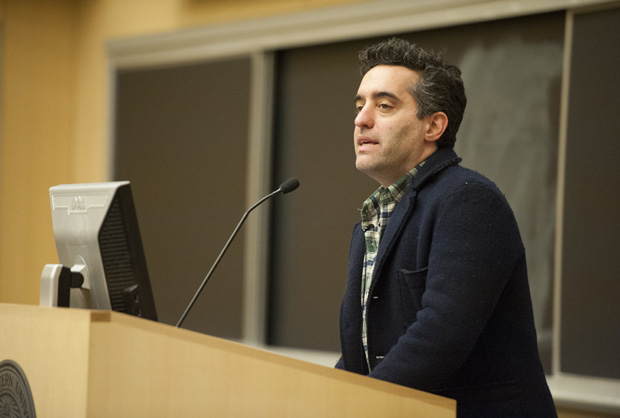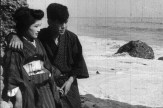How the Holocaust shaped one author’s life and literary career

Nathan Englander and his sister grew up in an Orthodox Jewish family and often played the “Anne Frank game,” wondering which of their gentile neighbors would hide them in the event of a second Holocaust.
“The Holocaust is woven into my understanding of the world,” said Englander, now the internationally bestselling author of the award-winning short story collection What We Talk About When We Talk About Anne Frank. “How do we remember? Who owns history? And how do we gift a memory across time?”
Englander, a fifth-generation American, explored these questions and the complexity of shedding light on culture and identity through a Jewish lens in the second annual Morton E. Ruderman Memorial Lecture on Monday evening in West Village F. The lecture was sponsored by the Ruderman Family Foundation and presented by the Jewish Studies Program and the Northeastern Humanities Center, both housed in the College of Social Sciences and Humanities. The lecture honors the memory of Morton E. Ruderman, who graduated in 1959 with an engineering degree and died in 2011 at the age of 75 after establishing the trustee Ruderman Chair in Jewish Studies.
“This lecture series is an opportunity to engage with prominent artists and writers who raise questions of universal significance,” said Uta Poiger, the interim dean of the College of Social Sciences and Humanities. “Reading great literature can be transformative for anyone in any field.”
Just ask Lori Lefkovitz, the Ruderman Professor of Jewish Studies, who classified Englander as a master storyteller. With work translated into more than a dozen languages, he was selected as one of “20 Writers for the 21st Century” by The New Yorker and has received many prestigious awards, including a Guggenheim Fellowship and a PEN/Malamud Award.
“Nathan knows how to tell a good story,” Lefkovitz said in her introductory remarks. “When I read his fiction, I sometimes laugh out loud, often through my tears.”
Audience members laughed during Englander’s reading of the title story in What We Talk About When We Talk About Anne Frank, a poignant portrait of two Jewish couples who sit around a kitchen table drinking and talking about religious identity.
In one particularly offbeat scene, two Holocaust survivors getting dressed in a gym locker room find out that their concentration camp identification tattoos are only five numbers apart.
“All that means is, he cut ahead of me in line. There, same as here. This guy’s a cutter, I just didn’t want to say,” one survivor says. “Blow it out your ear,” the other says.
In spite of the levity Englander brings to his prose, the goal of his writing has always been to explore how the past informs the future, whether the end game is preventing another genocide or civil war.
“We don’t know how to stop these things as global societies,” said Englander, referring to the civil war in Syria and the genocides in Rwanda and Darfur. “I don’t write about Jewish people,” he added. “I write about people.”
Following his lecture, Englander answered questions posed by audience members. One person asked how survivors have responded to his writing.
“It’s not threatening to survivors I have spoken to,” said Englander, who discussed his writing process with a group of students in the Humanities Center earlier in the day. “These are heroic people. They’re unbelievable to me.”





